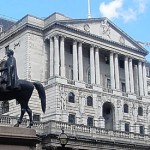 The Bank of England has decided to keep interest rates at the record low of 0.5%, but warned that a Brexit vote could tip Britain into recession.
The Bank of England has decided to keep interest rates at the record low of 0.5%, but warned that a Brexit vote could tip Britain into recession.
Mark Carney, the governor of the Bank of England, said that leaving the EU could have “material” consequences for UK growth. He went on to say that this could result in interest rates being raised in order to bring inflation under control.
He said a range of outcomes were possible, including a “technical” recession – defined by two successive quarters of negative growth.
“A vote to leave the EU could have material economic effects – on the exchange rate, on demand and on the economy’s supply potential – that could affect the appropriate setting of monetary policy,” Carney said.
The Bank’s Monetary Policy Committee said that in the event of a Brexit vote it could potentially raise the base rate in order to bring inflation under control.
“The MPC would take whatever action was needed, following the outcome of the referendum, to ensure that inflation expectations remained well anchored and inflation returned to the target over the appropriate horizon.”
Leaving the EU could result in lower consumption and delay investment, the Bank said. It could also lead to a sharp fall in the value of the pound and cause unemployment to rise. Combined, these factors could lead to lower growth and higher inflation.
The MPC noted that in the event of a Brexit vote, it would face a trade-off between stabilising inflation on one hand or output and employment on the other.
Chancellor George Osborne said: ”So one choice would impose costs on families as higher inflation reduced real household incomes; the other choice would impose costs on families with a hit to the economy and to jobs. This is the kind of lose-lose situation that a vote to leave the EU creates. Either way, Britain would be poorer.”
Jeremy Duncombe, director at Legal & General Mortgage Club, said: “Though base rates may stay low for the foreseeable future, it is important for customers to be aware that the base rate and fixed rates on their mortgages are not necessarily linked.
“These fixed rates are largely open to influence from external factors, and current uncertainties in the market could see these rates increase, even if a base rate rise seems a distant prospect. This means now is good time for borrowers to consider a remortgage and secure a favourable fixed rate, before any potential rise in the future.”
Richard Pike, Phoebus Software sales and marketing director, said: “Now the whole country, and consequently the economy, is in limbo. What is going to happen, what will be the result if we stay in the EU, or how will the UK change if we vote to leave? There are unfortunately no accurate predictions; the Bank itself has cut growth forecasts leaving us believing that it too is erring on the side of caution. With just over a month to go until the vote we don’t have long to wait, but in the meantime just how deep will the uncertainty be felt economically?”




